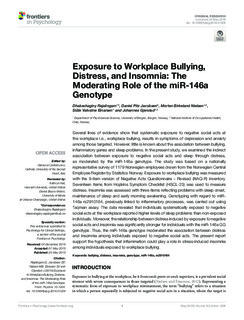| dc.description.abstract | Several lines of evidence show that systematic exposure to negative social acts at the workplace i.e., workplace bullying, results in symptoms of depression and anxiety among those targeted. However, little is known about the association between bullying, inflammatory genes and sleep problems. In the present study, we examined the indirect association between exposure to negative social acts and sleep through distress, as moderated by the miR-146a genotype. The study was based on a nationally representative survey of 1179 Norwegian employees drawn from the Norwegian Central Employee Register by Statistics Norway. Exposure to workplace bullying was measured with the 9-item version of Negative Acts Questionnaire – Revised (NAQ-R) inventory. Seventeen items from Hopkins Symptom Checklist (HSCL-25) was used to measure distress. Insomnia was assessed with three items reflecting problems with sleep onset, maintenance of sleep and early morning awakening. Genotyping with regard to miR146a rs2910164, previously linked to inflammatory processes, was carried out using Taqman assay. The data revealed that individuals systematically exposed to negative social acts at the workplace reported higher levels of sleep problems than non-exposed individuals. Moreover, the relationship between distress induced by exposure to negative social acts and insomnia was significantly stronger for individuals with the miR-146a GG genotype. Thus, the miR-146a genotype moderated the association between distress and insomnia among individuals exposed to negative social acts. The present report support the hypothesis that inflammation could play a role in stress-induced insomnia among individuals exposed to workplace bullying. | |
